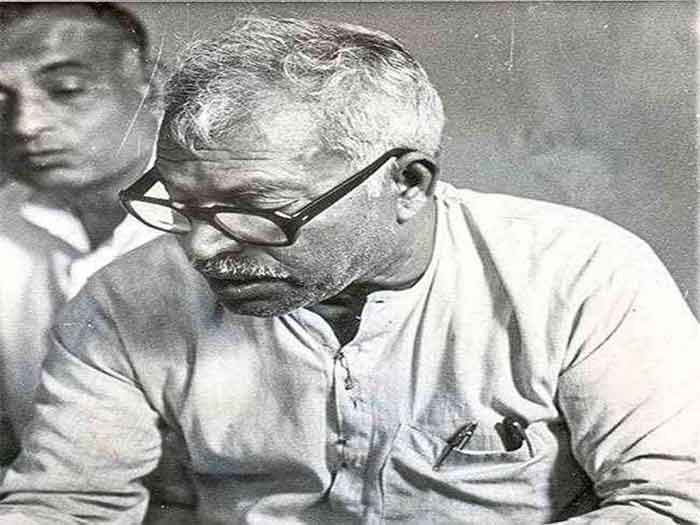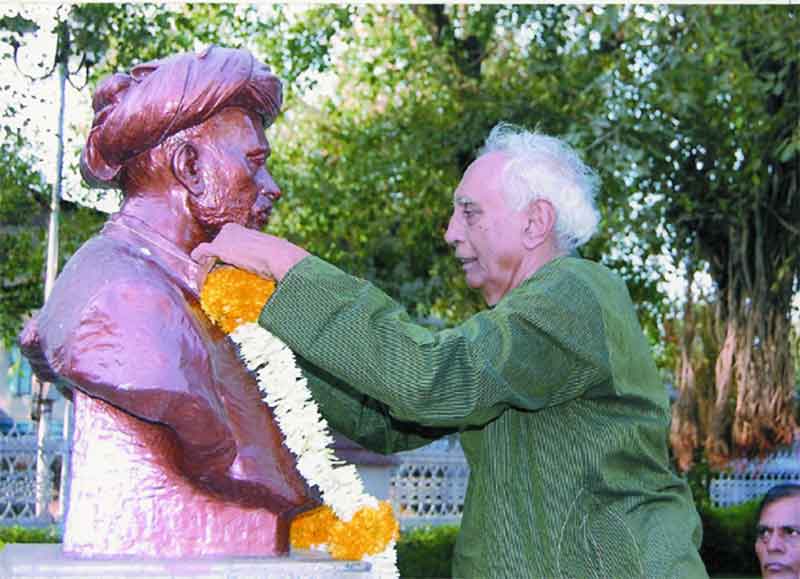
Karpoori Thakur, popularly known as Jananayak (people’s leader), devoted his entire life for the welfare of socially backward classes. He is considered to be one of the greatest and honest leaders that Bihar has ever produced. In the words of Paul Brass, Karpoori is one among the leaders whom he “loved and admired” because they see “politics as their vocation, pursue clearly stated goals, and do not enrich themselves in the process” (Brass 2011: xxi). The life and journey of Karpoori Thakur can be mapped in four phases: first, his exposure to socialist ideology; secondly, his acceptance as a mass leader where he received support from across the communities; thirdly, his contribution to the politics of Bihar; and lastly, his contribution in appealing to the conscience of the Most Backward Castes (MBCs).
Karpoori Thakur’s Exposer to Socialist Ideology
Born in a Nai family on 24 Jan 1921 at Pitaujhiya village in Dharbhanga (present Samstipur), Karpoori Thakur had a keen interest in political activism and he took part in the Quit India Movement and remained in jail from 1942 to 1945. He was a member of the All India Student Federation (AISF) and was a college drop out. During the lifetime of Ram Manohar Lohia, Karpoori played a decisive role in the politics of Bihar. Karpoori was largely influenced by the ideology pursued by Lohia and thereby continued to carry his legacy throughout his lifetime. He got influenced by socialist ideology and associated with the Congress Socialist Party till 1948 and remained adhered to socialist principles during his lifetime.
Karpoori Thakur as a Leader of the Masses
His popular slogan azadi aur roti (freedom and bread) sums up his inclusive politics comprising social justice, self-respect, dignity and development. Karpoori Thakur’s presence as a Member of Legislative Assembly since 1952 until his death on 17 Feb 1988 with a small break in 1977, and remained a member of the Lok Sabha depicts his degree of acceptance and popularity that Karpoori received across castes and communities. He was the Chief Minister of Bihar twice and held the position of the Deputy Chief Minister once. In his entire journey, he lost the Lok Sabha election only once during 1984. During his tenure, he mentored leaders like Ram Vilas Paswan, Lalu Prasad Yadav, Nitish Kumar and several others. After the death of Lohia, he became the highest leader in Bihar. With a decade long struggle over issues of reservation, the foundation was laid by the Samyukta Samajwadi Party for the backward class movement. Since then, the leaders among the landed backward classes (the Yadavs, the Kurmis, the Koeris) were either part of Congress party or in the absence of an articulated leader, they chose to rally behind Karpoori Thakur. Meanwhile in 1959, Lohia’s supporters adopted a resolution to secure a 60 percent reservation in government jobs for the SCs, the STs, the OBCs and the religious minorities. Implementation of the resolution on reservation became the agenda for the socialists after the convergence of the Bihar State Backward Class Federation and Lohi’s Samajwadi Party in 1957. Karpoori Thakur was able to unite the backward classes for the common interest; and in 1970, he became politically powerful in the politics of Bihar.
Karpoori’s Contribution to the Politics of Bihar
Karpoori Thakur’s government was marked by the introduction of controversial policies such as removing English as a compulsory subject in matriculation, policies on language and employment, banning alcohol in the state, and advocating and appealing the Dalits to become armed for their own security. In 1967, when he was the deputy CM and the education minister of Bihar, he abolished English as a compulsory subject; in 1970, when he was the CM for 163 days, he introduced free elementary education in schools till the eighth standard and made Urdu as a second official language of Bihar, and abolished land taxation for possession up to 5 acres.
When he became the CM for a second tenure, apart from the above policies, his tenure was marked for the introduction of policies of reservation for backward classes which had provisions of sub-quota for the more vulnerable within the backward classes. He himself belonged to a community whose numerical strength was small and hence politically ineffective. The sub-categorisation that he introduced was later came to be known as ‘Karpoori Thakur Formula’. During his government, he introduced the Mungeri Lal Commission which submitted its report in 1977. In the following year, he ordered to implement 26 percent reservation policy for the backward classes which was categorised into Annexure I (more backward classes), also known as the Extremely Backward Castes (EBC) and Annexure II (less backward classes). Annexure I was allocated 12 percent reservation in government posts while Annexure II had provisions of 8 percent reservation for the less backward classes, and 3 percent reservation was to be allocated to women from any community and 3 percent to the economically backward groups. Prior to this in 1951, the first Chief Minister of Bihar introduced sub-categorisation with the purpose of introducing scholarship for students. Following the legacy of Karpoori Thakur, the Chief Minister of Bihar in 2007 on his jayanti said at Ravindra Bhawan that things were discussed to merge Annexure I and Annexure II. The party declared then and there that nothing and no power could take away which had been provided by Karpoori Thakur and this was the root cause of difference between the RJD and the JDU.
However, even after the introduction of the sub-categorisation formula for the backward classes, it is the less backward classes who have dominated the politics of Bihar. Those who have been in the driving seat have served the interest of their community. In recent times, the EBC’s resentment towards the RJD and the JDU has increased because without increasing the reservation for the EBC, they have additionally added certain castes by transferring them from Annexure II to Annexure I. In response to this, the lower backward classes have accused the EBC of breaking the larger backward class solidarity.
Karpoori Thakur in Pursuit of New Political Partner
In the last phase of his life, Karpoori Thakur found himself in the situation of helplessness. This was because he felt he was betrayed by his own OBC community since he throughout his life made attempts to unite the OBCs under a common banner. Later on, after realising the significance of strength in each caste within the OBCs, his leadership was challenged by a section of the dominant OBCs. The numerical strength of Karpoori Thakur’s support was very less which made his situation vulnerable. In the 1980s, since the Yadavs constituted half of the total MLAs within the Lok Dal, they replaced Kapoori Thakur with Anup Yadav. Later, Lalu Yadav replaced Anup Yadav. Lalu Yadav nicknamed Karpoori Thakur as “Kapati” (foxy) Thakur.
Karpoori faced humiliation from those dominant OBCs, for whom he spent his entire life in making them realise their political and thus worked for unification of this class. In the words of A.N Sinha, Karpoori Thakur said, “I would not have faced such humiliation, if I were born a Yadav” (Sinha 2011:121).
At the end, Karpoori Thakur realised the need for consolidation the Most Backward Classes in Bihar to gain their support base. On 19 June 1983, while inaugurating the Bihar Pradeshik Kaivart Sammelan, he emphasised the need for cultivating consciousness among the MBCs and setting up an organisation to carry forward their social and economic revolution. He believed only through this path justice would be delivered to the excluded and marginalised groups.
Omprakash Mahato is a senior research scholar at Centre for Political Studies, Jawaharlal Nehru University, New Delhi and co-author of a book chapter with Sharad Yadav, The Importance of Shudra Politics in India in an edited book titled The Shudras: Vision for a New Path and was a Project Lead for report titled Who Tells Our Story Matters: Representation of Marginalised Caste in Indian Media and Gender Representation in Indian Newsrooms released at The Media Rumble 2022.
















































